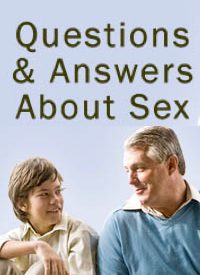
The United States Department of Human Health Services seems to be pushing for the sexualization of young children. According to the HHS website, children are in fact “sexual beings.” This revelation comes around the same time as a group of psychologists are pushing to decriminalize pedophilia. The combination could prove to be a recipe for trouble and for the loss of childhood innocence.
In the “Questions and Answers About Sex” section of the HHS website’s “Quick Guide to Healthy Living,” (illustration at left) children and infants are described as “sexual beings.” The site indicates:
Children are human beings and therefore sexual beings. It's hard for parents to acknowledge this, just as it's hard for kids to think of their parents as sexually active. But even infants have curiosity about their own bodies, which is healthy and normal.
According to the site, children engage in a variety of sexual behaviors:
Toddlers will often touch themselves when they are naked, such as in the bathtub or while being diapered. At this stage of development, they have no modesty. Their parents' reaction will tell them whether their actions are acceptable. Toddlers should not be scolded or made to feel ashamed of being interested in their bodies. It is natural for children to be interested in their own bodies. Some parents may choose to casually ignore self-touching. Others may want to acknowledge that, while they know it feels good, it is a private matter. Parents can make it clear that they expect the child to keep that activity private.
Parents should only be concerned about masturbation if a child seems preoccupied with it to the exclusion of other activities. Victims of sexual abuse sometimes become preoccupied with self-stimulation.
The website goes on to explain that discussions of sex with children should not be avoided:
If your child doesn't ask questions about sex, don't just ignore the subject. At about age 5, you can begin to introduce books that approach sexuality on a developmentally appropriate level. Parents often have trouble finding the right words, but many excellent books are available to help.
Age 5? Most children at this age are still attempting to overcome the challenge of tying their shoelaces and recognizing simple but oft-used words like “cat” and “car.”
This is not the first time we have seen a group encourage early introductions to sexuality, however. In 2009, the United Nation’s Economic, Social and Cultural Organization (UNESCO) published a 98-page report that included a curricula for children between the ages of 5 and 18 which encouraged teaching children as young as the age of 5 about masturbation and “gender roles, stereotypes and gender-based violence.”
Fox News reported on the UNESCO report:
Under the U.N.'s voluntary sex-ed regime, kids just 5-8 years old will be told that "touching and rubbing one's genitals is called masturbation" and that private parts "can feel pleasurable when touched by oneself."
. . . By the time they're 9 years old, they'll learn about "positive and negative effects of 'aphrodisiacs," and wrestle with the ideas of "homophobia, transphobia [prejudice against transsexuals] and abuse of power."
At 12, they'll learn the "reasons for" abortions — but they'll already have known about their safety for three years. When they're 15, they'll be exposed to direct "advocacy to promote the right to and access to safe abortion."
In other words, not only should parents encourage sexuality in their children, but should also advocate the use of abortion.
UNESCO later published a report entitled “International Technical Guidance on Sexuality Education,” wherein they wrote, “It is never too early to start talking to children about sexual matters.”
That report also indicates that parents should refrain from teaching children about morality, as there are no right and wrong values, and asks parents to encourage children to “experience genital pleasure” from birth until age 2, and by age 3, to encourage “sex play.”
It also discourages parents from enforcing traditional gender identities and indicates that parents who do so are driven by homophobia. Instead, the report encourages parents not to limit how boys and girls express themselves, even if it involves homosexual behavior.
Similarly, the HHS website asserts that it’s just as natural for children to think about sexuality with those in the same sex, as it is with the opposite sex, particularly amongst teenagers:
This type of imagining about people of the same or opposite sex doesn’t necessarily mean that a person fits into a particular type of sexual orientation. Some teens may also experiment with sexual experiences, including those with members of the same sex, during the years they are exploring their own sexuality. These experiences, by themselves, do not necessarily mean that a teen is gay or straight.”
In response to some of the assertions found on the HHS website, Peter Sprigg, a senior fellow at the conservative Family Research Council contends that the federal government should have no role in addressing the sexuality of children and infants:
“The idea that ‘children are human beings and therefore sexual beings’ is one of the most destructive myths of the sexual revolution. To a large extent, this myth may be traced to the ‘research’ conducted by Alfred Kinsey, including the infamous ‘Children of Table 34’ experiments, which involved the deliberate sexual abuse of children as young as 6 months old under ‘experimental’ conditions.
The fact that young children are aware that their bodies include genitalia hardly makes them ‘sexual beings,’ and it is improper (and potentially dangerous) to treat them as such before puberty.”
Those potential dangers are exacerbated by the efforts of a group of mental health professionals, called “B4U-ACT,” to decriminalize and normalize pedophilia. A statement by the group reads:
“Stigmatizing and stereotyping minor-attracted people inflames the fears of minor-attracted people, mental health professionals and the public, without contributing to an understanding of minor-attracted people of the issue of child sexual abuse.”
The goals of B4U-ACT is to encourage tolerance of pedophiles. One wonders what could happen if Americans began to tolerate pedophiles while simultaneously accepting the position that children are in fact sexual beings.





